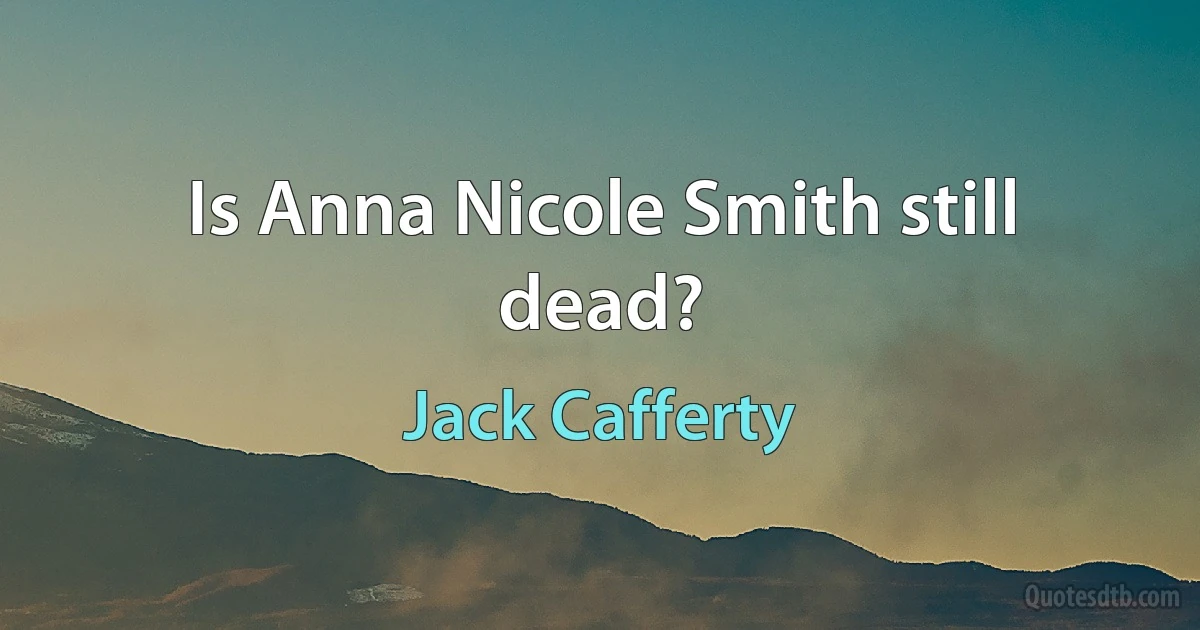Smith Quotes - page 5
Cut is the Sure Start maternity allowance. Has [the Secretary of State for Work and Pensions, Iain Duncan Smith] no idea at all that supporting a family and getting the children out of poverty when the babies are born can save money from the public purse for years to come? Instead, he wants to cut support from the babes in their mothers' arms. At least Margaret Thatcher had the grace to wait until the children were weaned before snatching their support.

Yvette Cooper
Nonsatiation (Smith, 1976a). Given a costless choice be ween two alternatives which differ only in that the first yields more of the reward medium (e. g., currency) than the second, the first will always be chosen (preferred) over the second by an autonomous individual, i. e., utility U(M) is a monotone increasing function of the reward medium.

Vernon L. Smith
Well alright, anyone who has dreams of world empire, look what it did to Britain (chuckles heartily). There's a reason that whole country is one big Smith song. That's actually one exciting thing about studying history, there did come a point towards the end of the 19th century where the British were just like, "this ain't worth it mate". There's a reason why in 1945 they gave us the keys to the world. They were like, "here, it's yours, take it, go, we're fine, no? India, go. Africa, go." Because they'd had enough. Because it's really hard, we can't even run ourselves. We literally have people storming our capital with signs saying, "government, keep your hands off my social security". If we can't handle that, do we really want to try and run, Africa? I think what we need is not so much world empire, I think we need closer cooperation, closer alliances.

Max Brooks
Smith had many fine qualities as a political leader. However, he was very much a creature of his background. His life revolved around the cricket team, the whites only school, the RAF, the country club and the company of other gentleman farmers. He never escaped from this or saw beyond it.

Ian Smith
Ian Smith lived an exemplary family life and in private was a down-to-earth, modest man. Ian Smith was not corrupt nor was he a megalomaniac. However whilst Ian Smith acted in what he thought were the best interests of then Rhodesia he made some disastrous political decisions as Prime Minister which directly contributed to the trauma that Zimbabwe is suffering from today... The policies of his Rhodesia Front party radicalized black nationalists and directly spawned the violent and fascist rule of Zanu PF.

Ian Smith
Smith was being realistic-if you give people something before they are ready [for it] they are going to mess it up. And that has happened. If he had had the opportunity to work with the people [and] help bring them up, Zimbabwe would be a better place now. Smith did make it better during his government. There is no reason why he could not do that if he had been allowed to go on.

Ian Smith
The roads that we are using today were all built by Smith. All the infrastructure is Smith's. We never suffered the way we are suffering now because Smith took care of the economy that supported all people and they had enough to eat. When he left power the [British] pound was on a par with the Zimbabwean dollar, but President Mugabe has killed all that.

Ian Smith
Despite his friendship with Adam Smith, he believed in government intervention in agriculture, as it was too important to be left to market forces and chance: ‘The husbandman maintains the nation in all its ease, its affluence and its splendour,' he wrote. But farmers too had a responsibility for the public good. Rotation of crops, ensuring equal acreages of different crops at any given time, would help keep prices stable.

Stephen Baxter
It was the college conservatives who had almost succeeded in electing John Smith to the Presidency of the United States during the last election. The fact that Smith had been dead for twenty years had not dampened their ardor; quite the contrary, many considered this the candidate's best quality.

Robert Sheckley
There is a fundamental confusion between the notion of the older 'semantics' as connected with a theory of verbal 'meaning' and words defined by words, and the present theory of 'general semantics' where we deal only with neuro-semantic and neuro-linguistic living reactions of Smith, Smith, etc., as their reactions to neuro-semantic and neuro-linguistic environments as environments.

Alfred Korzybski
No man can defend or palliate such conduct as that of Smith O'Brien and his confederates. It would be a mercy to shut them up in a lunatic asylum. They are not seeking a repeal of the legislative union, but the establishment of the Kings of Munster and Connaught! But the sad side of the picture is in fact that we are doing nothing to satisfy the moderate party in Ireland, nothing which strengthens the hands even of John O'Connell and the priest party, who are opposed to the 'red republicans' of the Dublin clubs. There seems to be a strong impression here that this time there is to be a rebellion in Ireland. But I confess I have ceased to fear or hope anything from that country. Its utter helplessness to do anything for itself is our great difficulty. You can't find three Irishmen who will co-operate together for any rational object.

Richard Cobden
If I were five-and-twenty or thirty, instead of, unhappily, twice that number of years, I would take Adam Smith in hand-I would not go beyond him, I would have no politics in it-I would take Adam Smith in hand, and I would have a League for free trade in Land just as we had a League for free trade in Corn. You will find just the same authority in Adam Smith for the one as for the other; and if it were only taken up as it must be taken up to succeed, not as a political, revolutionary, Radical, Chartist notion, but taken up on politico-economic grounds, the agitation would be certain to succeed; and if you apply free trade in land and to labour too-that is, by getting rid of those abominable restrictions in your parish settlements, and the like-then, I say, the men who do that will have done for England probably more than we have been able to do by making free trade in corn.

Richard Cobden
The Mercantile System still had a certain artless Catholic candour and did not in the least conceal the immoral nature of trade. ... But when the economic Luther, Adam Smith, criticised past economics things had changed considerably. ... Protestant hypocrisy took the place of Catholic candour.

Friedrich Engels
It is impossible to read the works of the economists who since the time of Smith have endeavored to build up and elucidate the science of political economy without seeing how, over and over again, they stumble over the law of wages without once recognizing it. Yet, "if it were a dog it would bite them!" Indeed, it is difficult to resist the impression that some of them really saw this law of wages, but, fearful of the practical conclusions to which it would lead, preferred to ignore and cover it up, rather than use it as the key to problems which without it are so perplexing. A great truth to an age which has rejected and trampled on it, is not a word of peace, but a sword!

Henry George
In like manner the Reverend Dr. William A. Smith, President of the Randolph-Macon College in Virginia, in his work upon the Philosophy and Practice of Slavery, deliberately repudiates Mr. Jefferson's view of slavery as a 'grossly offensive error', and attributes the anti-slavery movement to him – which is as wise as to attribute the motion of the earth to Galileo. Judge Wayne, in his late charge at Savannah upon the law against the slave-trade, confirms Mr. Stephens's statement. And, as if to establish it by the most unexpected testimony, Mr. Edward Everett, in his late discourse upon Daniel Webster, said, 'In common with all, or nearly all, the statesmen of the last generation, he believed that free labor would ultimately prevail throughout the continent'.

George William Curtis
Most of the world's believers reject these claims (i. e., of Scientology, Mormonism, and Christian Science) as blatantly false. But that's only because these three religions are fairly new. They were founded in the last two centuries, and we see their origin not as divine but as obvious fabrications of humans-in the case of Joseph Smith, of a con man. But if you look with equally critical eyes at the doctrines of older faiths, their tenets seem equally bizarre.

Jerry Coyne

![Smith was misunderstood in a lot of ways. He is an African [and] understands the African mentality. It wasn't his problem what happened in Rhodesia. He came in [to power] in 1965 after Winston Field, so he was along the system that had been created. If you look at the development of Rhodesia, Smith contributed enormously [to] that. It didn't only benefit the whites, it benefited the blacks. (Ian Smith)](https://cdn.quotesdtb.com/img/quotes_images_webp/62/ian-smith-african-benefit-485262.webp)

